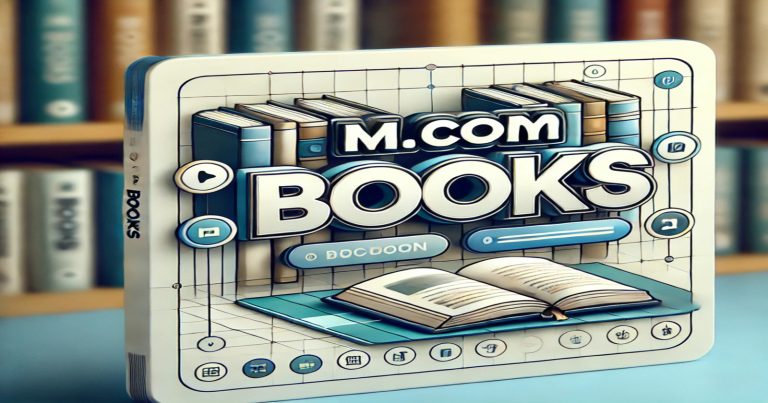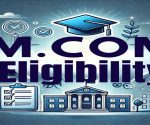M Com books are the foundation for Master of Commerce or M.Com aspirants. These cover abstract concepts and practical applications of commerce, economics, and management. Whether you are a student who is studying M Com 1st yearbooks or searching for M Com 2nd yearbooks or is an aspirant for the M Com entrance exam; the right study material is very important to succeed. This article shows a very detailed guide about everything you need to know about M.com, including course structure, subjects, and best reference books for each semester.
What is M Com?
A master of Commerce or MCom is a postgraduate degree that spans two years. It provides further knowledge of the subject, whether it is commerce, finance, and management. In other words, students are taken ahead of the basic principles that are taught at an undergraduate level by equipping them with advanced skills to master accountancy, economics, and all business operations.
Why Pursue MCom?
It is a two-year course that has four semesters.
- Eligibility: The candidate must hold a Bachelor’s degree in Commerce (B.Com) or any other relevant field.
- Specialization: Accounting, marketing, taxation, international business, and more
- Career Scope: Financial analyst, accountant, tax consultant, auditor, and academics.
M.Com provides students with a solid base to make a career in professional fields or further studies as researchers or to pursue doctoral degrees on a single platform. It enhances the analytical problem-solving and decision-making ability needed in the commerce industry.
M Com Course Structure
M. Com Course structure is prepared to assimilate theory along with the development of practice skills and expertise in the given particular field. M Com Course comprises Core Subjects, electives, projects, and research work, whereby a student equips himself/ Herself suitably in each phase of the commerce disintegrating M Com Course Syllabus.
Core Subjects
Major core subjects of M.Com are an integral part of the program and manage a deep understanding of topics like financial accounting, business management, and economics.
Elective Subjects
Students can opt for electives, making them specialize in any particular field such as taxation, marketing, or international trade. This way, the student can shape his learning according to his career goals.
Dissertation and Research Work
M.Com is full of research. The students have to submit dissertations and projects; therefore, they can apply their theoretical knowledge under practical conditions.
Assessment and Exams
Assessment through written exams, projects, presentations, and case studies are practised to evaluate the students’ understanding.
Semester-Wise Overview of M.Com Curriculum
| Semester | Subjects Covered | Highlights |
| Semester 1 | Managerial Economics, Accounting Principles | Focuses on fundamentals of economics and accounting. |
| Semester 2 | Financial Management, Research Methodology | Covers advanced finance and research strategies. |
| Semester 3 | Taxation, Human Resource Management | Explores laws, taxation policies, and HR strategies. |
| Semester 4 | Corporate Governance, Dissertation | Emphasizes corporate ethics and practical research. |
This structure ensures that M.Com graduates are well-prepared for professional and academic challenges.
M com Syllabus
The subjects of M.Com are precisely designed to cover all subjects that establish students’ mastery over key areas of commerce and specialize in areas of subjects that suit the interest of the students and their career paths. The subjects are broadly categorized into two heads: core and electives.
Core Subjects of M.Com
- Managerial Economics: It discusses applying economic principles in making managerial decisions.
- Financial Accounting: Financial accounting teaches how to prepare and analyze financial statements.
- Business Environment: The external and internal factors that affect businesses.
- Statistical Analysis: A field of decision through data and statistical tools.
Corporate Governance: Concerns the ethical practices for business combined with legality.
Elective Subjects in M.Com
- International Business: Trade and investment dynamics.
- Marketing Strategies: Consumer behavior, market research, and branding techniques.
- Human Resource Management: Recruitment and training combined with employee management.
- M Com subjects: would basically remain that exact balance between theoretical knowledge and practical. Thus, it would prepare the students for all types of commerce and industry jobs.
M Com 1st Year Books
The books for M.Com’s first year play a crucial role in students’ understanding of basic concepts. The books are designed to achieve an all-round knowledge of core subjects, which are stepping stones for further advanced studies in the second year.
Top Books for M Com First Year
- Managerial Economics by Sen Anindya: This book presents complex economic theories in simplified words and relates their application to the managerial decisions of an organization. Very much recommended to understand the market dynamics and managerial decision-making process.
- Statistics for Management by Levin and Rubin: The book describes statistical tools and techniques used in the management study. It would serve as a valuable resource for students seeking a strong grounding in quantitative analysis skills.
- Accounting for Managerial Decisions by Jawahar Lal: In this book, advanced accounting principles are discussed about their function in managerial decision-making.
- Business Environment by Francis Cherunilam: Business environment This guide explains the outside factors and factors within the business that configure the firms into the economy of a global scenario.
Why Do These Books Matter?
Such concepts found in M.Com’s first year are foundation concepts. After achieving mastery of those subjects, students can easily transition into more advanced topics covered in the second year.
M Com 2nd Year Books
M Com second year is very important, and for this, research works are concentrated as well as actual implementations, for which relevant books have been added below:
Important M Com 2nd Year Books
- Corporate Governance by Adrian Cadbury: The book forms ethical business practice and adherence principles. High specialism can be attained concerning the stream through these book study pages, Corporate Governance.
- Marketing Management by Philip Kotler: This book is a gold standard for marketing strategies, consumer behavior, and brand management.
- Advanced Management Accounting by Ronald W. Hilton: This book describes complex concepts of cost accounting and managerial decision-making.
- R.A. Brealey and S.C. Myers: Principles of Corporate Finance: This book provides comprehensive information on financial decision-making, investments, and corporate policies.
Why M Com 2nd Year Books?
Research and dissertation work are involved in the second year. Reading these advanced books enhances critical thinking skills, which are very essential for real-life applications and competitive exams.
M Com Reference Books and Authors
Reference books provide additional insights and perspectives, helping students better understand subjects. They are indispensable for exam preparation and research work.
Highly Recommended Reference Books for M.Com
| Subject | Book Title | Author |
| Organizational Behavior | Organizational Behaviour (13th Edition) | S.P. Robbins |
| Microeconomics | Micro-Economics: Theory and Applications | Sen Anindya |
| Corporate Finance | Principles of Corporate Finance | R.A. Brealey & S.C. Myers |
| Managerial Accounting | Advanced Management Accounting | Ronald W. Hilton |
| Statistics | Theory and Problems of Statistics | M.R. Spiegel |
Why Reference Books?
These are studied in-depth, and such books cover advanced topics. There are case studies, real-life applications, and research-based inputs, including reference books, which go a long way in scoring well in the examinations and producing good work in research.
IGNOU MCom Books
IGNOU provides study books on M. Com, and their books are reasonably priced. Although it can prove pretty helpful to the regular student because examples and practical study notes are very short.
Major features of IGNOU M Com books
- Explain subjects at very deepr elective type and elaborate form
- Provides examples easily as well as case study type.
- According to the current syllabus.
- Many students refer to IGNOU M Com books as secondary reference materials to clear confusion and build concepts.
How to Prepare for M Com Entrance Exam with Books?
The entrance exam requires complete preparation for those who want to pursue M.Com courses from top colleges. The first important step is choosing the right books for preparation.
Top Books for M Com Entrance Test Preparation
- Advanced Accounting by R.L. Gupta
- Covers all accounting concepts required for entrance exams.
- Business Studies by Poonam Gandhi
- Thorough overview of business management principles.
- Quantitative Aptitude by R.S. Aggarwal
- Aids in handling the quantitative sections of the entrance exam.
- How to Do Well in Entrance Exams
- Spend time on each subject and focus on weak areas.
- Practice mock tests and previous years’ question papers.
- Entrance-specific books are referred for targeted preparation.
M.Com Books FAQs
What are the best M Com books for first-year students?
Some of the best M Com books for first-year students are “Managerial Economics” by Sen Anindya and “Accounting for Managerial Decisions” by Jawahar Lal.
Are IGNOU M Com books ideal for regular students?
Yes, IGNOU M Com books are perfect and ideal for all students who cover both the core and the elective subjects.
Which books should I refer to for the M Com entrance exam?
Books like “Advanced Accounting” by R.L. Gupta and “Business Studies” by Poonam Gandhi are highly recommended.
Where can I buy M Com sem 1 books?
You may find books for M Com sem 1 at online sites, such as Amazon, or in the university bookstore.
What are the best books for M Com 2nd year specialization?
For specialization refer to “Corporate Governance” by Adrian Cadbury and “Marketing Management” by Philip Kotler.


